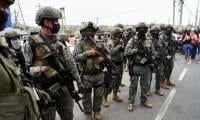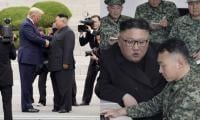Modi in Dhaka
Indian PM Narendra Modi’s two-day visit to Bangladesh in late March, his first since the outbreak of the Covid-19 pandemic, was marred by violent protests that claimed the lives of over a dozen people. The security forces’ disproportionately harsh response to the initial protest had a domino effect, as people came out in large numbers in various parts of the country to denounce the visit in defiance of the police highhandedness.
The violence, widely reported around the world, headlined the visit of the Indian premier and took the spotlight away from the substance that marks the Indo-Bangladesh relationship. Received at the airport by Prime Minister Hasina Wajid along with her cabinet members, a move that was described as a ‘special gesture’ from Dhaka, Modi was a guest of honour at the 50th Independence Day celebrations of Bangladesh as well as the 100th birthday anniversary of Bangladesh’s founder and the first prime minister Sheikh Mujib-ur-Rehman.
Modi’s visit followed a series of close interactions, starting with a virtual meeting with his Bangladeshi counterpart in December 2020, the participation of a 122-member Bangladeshi military contingent in India’s Republic Day parade in January 2021, and a virtual inauguration of a ‘friendship bridge’ on March 9.
A visit by Indian Foreign External Affairs Minister S Jaishankar to Dhaka on March 4 finalized the agenda for Modi’s visit with the Indian MEA statement describing the visit as an “opportunity to take stock of the progress in bilateral relations.”
As the recent violent protests underlined, Sheikh Hasina’s India policy (tilt towards Modi) suffers from the lack of overwhelming support. The events laid bare the wide cracks in the stated policy and its willing acceptance by the people.
A major section of the Bangladeshi population has always entertained anti-India apprehensions, irked by the ‘big brotherly’ attitude of New Delhi. This resentment has gradually become more pronounced ever since the BJP government came into power.
As Shaheen Huq, a Bangladeshi rights activist, stated in an interview with the BBC, “the anti-India sentiments turned into more of an anti-Modi feeling in Bangladesh.” Since his rise to power, Modi’s divisive, violence-prone and faith-based politics has not only deepened communal divides in India but also caused widespread resentment in Muslim-majority Bangladesh.
The Citizenship Act introduced by Modi in 2019 as part of the BJP’s agenda of making India a Hindu-only country drew widespread criticism in Bangladesh as well. Together with the National Register of Citizens (NRC), the citizenship law strengthened Modi’s anti-Muslim credentials. Under the law, his government announced a policy to give asylum to the ‘persecuted’ minorities from Pakistan, Bangladesh and Afghanistan, a move that was denigrated by the rights activists as well as the Indian opposition parties.
Compounding the anti-Modi resentment in Bangladesh has been the BJP’s plan to deport ‘unauthorized immigrants’ that failed to prove their citizenship rights in Assam through ‘legitimate’ documents.
Indian Home Minister Amit Shah’s highly insensitive remark during an election campaign that ‘illegal’ immigrants were ‘termites’ that his government will “pick up infiltrators one by one and throw them into the Bay of Bengal” caused quite a lot of anger in Bangladesh and led to the cancellation of several ministerial visits to New Delhi, effectively putting the pro-India Sheikh Hasina government on the defensive.
There is also a feeling among a section of Bangladeshi opinion that the concessions offered by the Bangladeshi government have not been adequately reciprocated by India that takes the relationship between the two countries for granted. Of paramount concern to the Bangladeshis has been the lack of agreement on resolving the water disputes between India and Bangladesh. Both countries share water from 54 rivers that flow upstream from India. Except for the Ganges River, there has been no agreement, which means that India can inflict a massive cost on Dhaka by virtue of its ability to regulate the water flow.
Modi timed his visit to Bangladesh with elections in several states including Assam and West Bengal that border Bangladesh. His visit to and worship at an ancient Hindu temple outside Dhaka was aimed at galvanizing his political support base in West Bengal.
India’s relationship with Bangladesh, as well as other regional countries, needs to be located and analyzed in the context of Modi’s neighbourhood policy, which seeks to achieve for India a ‘great power’ status through the establishment of r regional dominance.
Ahead of his India visit, Modi alluded to this policy in a tweet in which he stated, “Our partnership with Bangladesh is an important pillar of our Neighbourhood First policy, and we are committed to further deepen and diversify it…”
The Indian foreign policy establishment believes that the geostrategic (embrace of India by the US) and geo-economic shifts that are currently underway in the international order have created enormous opportunities for India. Modi, according to this line of thinking, is better suited to capitalize on the conditions, thanks to his hardcore support base as well as international charisma.
Intoxicated by ‘big-power hubris’, some commentators such as C Raja Mohan have gone to the extent of describing Modi’s foreign policy approach as the rise of the “Third Republic”, marking a break from the earlier phases in India's policy from the independence to liberalization (First Republic) and the end of the cold war (Second Republic).
As pointed out by experts, Modi’s South Asia policy faces a stiff challenge from China and Pakistan. These structural limitations have curtailed space for the Indian government to maneuver its way into the big boys’ club despite its repeated efforts and even readiness to become Washington’s proxy, thus establishing a wide chasm between intent and implementation.
The importance of Pakistan calling India’s bluff post-Balakot is manifold and needs to be clearly internalized to understand the reasons behind the recent phase in the India-Pakistan relations. For starters, it is an admission of India’s massive failure to isolate Pakistan diplomatically and strangulate it economically through lobbying at the FATF.
While Modi may have made a case for a second term solely on his Pakistan-bashing agenda, he clearly failed to change the terms of engagement with Islamabad. In addition to humiliating border clashes that punctured Modi’s regional ambitions, China has been transforming the geo-economic landscape of Greater South Asia through its connectivity and infrastructure projects.
In addition to Pakistan, other regional partners working with China as part of the Belt and Road Initiative (BRI) are Bangladesh, Iran, Nepal and Sri Lanka. Beijing has emerged as one of the principal players in Afghanistan and enjoys considerable leverage in Kabul as well as with the Taliban.
China’s growing assertiveness in South Asia and beyond has added to Modi’s nightmares and explains why there is increasing emphasis by his government on a sub-regional initiative, known as the Bay of Bengal Initiative for Multi-Sectoral Technical and Economic Cooperation (BIMSTEC).
India may make all the right noises regarding its relationship with Dhaka but the fact remains that its foreign policy approach towards Bangladesh betrays insensitivity and arrogance. New Delhi’s willingness to play the role of a proxy in the region reflects the cold-war mindset of its leaders that defies the contemporary realities and is poised to fail – yet again.
The writer, a Chevening scholar, studied International Journalism at the University of Sussex.
Email: amanatchpk@gmail.com
Twitter: @Amanat222
-
 Meghan Markle, Prince Harry Believe They Could Help King Charles, William As Royals Face Major Crisis
Meghan Markle, Prince Harry Believe They Could Help King Charles, William As Royals Face Major Crisis -
 Rob Rauscha Steps Away From Reality TV After 'The Traitors' Triumph: 'It's Not A Life I Want'
Rob Rauscha Steps Away From Reality TV After 'The Traitors' Triumph: 'It's Not A Life I Want' -
 Val Chmerkovskiy Shares Message With Fans After Hospitalization: 'Thank God, No Brain Tumour'
Val Chmerkovskiy Shares Message With Fans After Hospitalization: 'Thank God, No Brain Tumour' -
 China Achieves Breakthrough In High-speed Satellite-to-ground Laser Communication
China Achieves Breakthrough In High-speed Satellite-to-ground Laser Communication -
 AI Is Creating Jobs, Not Replacing Them—Here’s Why
AI Is Creating Jobs, Not Replacing Them—Here’s Why -
 Sharon Osbourne Gives Exciting Update On OzzFest
Sharon Osbourne Gives Exciting Update On OzzFest -
 Savannah Guthrie Receives Exciting Update In Mom Nancy Abduction Case
Savannah Guthrie Receives Exciting Update In Mom Nancy Abduction Case -
 Prince Harry Sends Strong Message To William Regarding Princess Eugenie, Beatrice
Prince Harry Sends Strong Message To William Regarding Princess Eugenie, Beatrice -
 Elon Musk: Tesla Set To Lead In AGI And Revolutionary Atom-shaping AI
Elon Musk: Tesla Set To Lead In AGI And Revolutionary Atom-shaping AI -
 Harry Styles Gets Candid About ‘existential’ Crisis As Album Release Nears
Harry Styles Gets Candid About ‘existential’ Crisis As Album Release Nears -
 Another Royal Ex Planning Tell-all As British Royal Family Face Crisis Upon Crisis
Another Royal Ex Planning Tell-all As British Royal Family Face Crisis Upon Crisis -
 Investors Keep Pooling Money To Buy Anthropic Shares Despite Ban
Investors Keep Pooling Money To Buy Anthropic Shares Despite Ban -
 US, Ecuador Launch Joint Military Operation Against Drug Trafficking
US, Ecuador Launch Joint Military Operation Against Drug Trafficking -
 Meta Builds Applied AI Organisation To Improve Model Performance
Meta Builds Applied AI Organisation To Improve Model Performance -
 EV Batteries At Risk: Can Technology Outsmart A Warming Planet?
EV Batteries At Risk: Can Technology Outsmart A Warming Planet? -
 Here’s How Latest AI Documentaries Expose Dark Side Of Technology
Here’s How Latest AI Documentaries Expose Dark Side Of Technology



